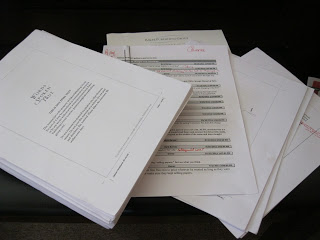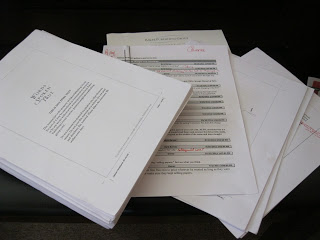 “I have been correcting the proofs of my poems. In the morning, after hard work, I took a comma out of one sentence…. In the afternoon I put it back again.”– Oscar Wilde (1854-1900)
“I have been correcting the proofs of my poems. In the morning, after hard work, I took a comma out of one sentence…. In the afternoon I put it back again.”– Oscar Wilde (1854-1900)Last week I got the pages of my book, Words Spoken True, scheduled for release in February. That’s what’s in the photo along with a list of corrections or places the copyeditor thinks still need some fine tuning. At this stage of the editing process, fine tuning is all you want to see the need to do.
Getting a book from my head to a book a reader can imagine in his or her head while reading takes a while. First I get the idea. Then I research the historical era I plan to drop my characters down into. Oh, and I have to think about those characters – what they did, what they liked, what they looked like, what they wanted, what problems they had – that kind of thinking goes on and on from the initial “wow moment” of getting an idea until I find those magical words “the end.” It takes me months to get a story down on paper – well, on the computer. Then comes the editing part. I like editing. To me that’s the easy part of writing. The pressure’s off. The story’s told. I just have to make it better by cutting out the words that don’t fit and changing the words that have to be there but might be awkward.
To me, editing is the process of making the words disappear and letting the story emerge. I want my reader to forget she is reading and to live the story with me. I don’t want the reader to hit a pothole of awkward phrasing that will jerk him out of the story. That’s why I work so hard at polishing my story every chance I get. And there are plenty of chances. First I do my own editing before I send it off to the editor. I want it to shine for that very first reader. But generally, no matter how I think it shines, the editor sees places that need a bit more polish and sometimes a major overhaul.
Once those changes are made to the editor’s satisfaction, then it’s passed on to a copyeditor who pays attention to every potential pothole that’s going to make the reading rough. That editor catches lapses in continuity of time or character traits or hair color or names or whatever. That editor points out when I’ve used a favorite phrase or word way too many times. I do have my pet words that my eyes simply must slide right over when I’m doing my early edits. I am getting better at noticing that sort of thing and fixing most of it before it gets to the copyeditor, but not all of it. Those are the galleys and where I can fix and rework to my heart’s content with the hope the editor is going to agree I’m improving the writing and fixing whatever problems she might have noted.
I’ve gone through all those stages with Words Spoken True. Now I’ve got the pages. Now I can’t just decide to rewrite half the scenes or whatever. This is the time for fixing typos and other minor changes. Little corrections because by now the big things should already be fixed. But it is one last chance to help make those words magically vanish as the reader imagines my story with me. My goal always is to tell a story about people that you want to invite into your hearts. I’m hoping you will love Adriane and Blake. They have a very romantic story set during a volatile period of history in Louisville.
So I’d best get to work reading through Words Spoken True for the last time this side of seeing it inside the fabulous cover that has been designed for it.
How do you feel about editing? Do you think the books you read have been carefully edited? Do you care as long as the story is exciting?
As always thanks for reading. This quote from Churchill made me smile. You know about what I’m talking. 🙂
“From now on, ending a sentence with a preposition is something up with which I shall not put.”
– Winston Churchill (1874-1965)

